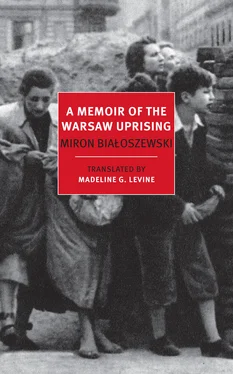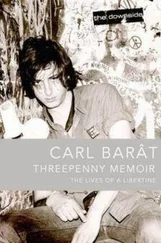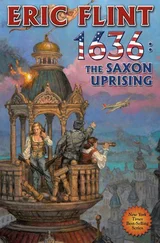It was 1935 when, for the first time in my life, I heard about bombardments. When the Italian fascists attacked Abyssinia. Lame Mania was visiting us, listening to the radio through earphones, and suddenly she announced, “They’re bombing Addis Ababa.”
I had a vision of Aunt Natka’s house on Wronia (I don’t know why that one precisely), the sixth floor, and that we’re there on the landing between the fifth and sixth floors. And that we start caving in along with those floors. Then right away I thought that was probably impossible. But in that case, what was it really like?…
What happened on the second day of August 1944? Since June the Allied offensive in the west had been moving across France, Belgium, Holland. And from Italy. The Russian front was at the Vistula. Warsaw entered the second day of the uprising. Explosions woke us. It was raining.
Organizing began. Block leaders. Duty tours. Shoring up cellars. Tunneling underground passageways. For nights on end. Barricades. At first people thought they could be made out of anything, such as the boards from the sawmill and the carts on Ogrodowa Street. (All of Ogrodowa — we looked out on it — was decked out in Polish flags — a strange holiday!) Meetings and conferences in the courtyards. Assignments: who, what. Possibly already a newssheet. Of the uprising. And in general the partisans. Showed up. In German castoffs — in whatever they could find: a helmet, boots, with anything at all in their hands, so long as it could shoot. We looked out onto Chłodna Street. And it was true: a front had been established. Throughout Warsaw. Right away. Or rather, several fronts. Which the first night established. And the day began to force back. This was reported in the newssheets. There were explosions. All sorts. From cannons. Bombs. Machine guns. Was it the front? The real one, the German-Russian front? It was moving from somewhere near Modlin toward Warsaw (our great hope). Nothing dreadful yet from Wola. But Chłodna Street was in trouble. It seemed to be ours. Already decked in flags, I think. But on the corner of Waliców and Chłodna there was a Wache — a guard post. There was a second Wache (the building with the columns) on the corner of Żelazna and Chłodna. “Wache” meant a building held by the Germans, and that meant shooting from above (from all six stories). Machine guns. Grenades. Every so often a single shot from the roof, from behind a chimney, someone wounded, someone killed. It was those concealed men who were shooting.
“Pigeon fanciers,” people called them. They were chased, hunted down, but nothing came of it. They fired from our buildings. Later they were being caught. But there were a lot of them. All the time. To the very end. It seems they would walk behind the tanks as they rode by and jump through the gates. Shells hurtled in from the German districts, from Wola, from the freight station or the tracks, from an armored train, from the Saxon Gardens. Planes flew overhead and dropped bombs. Every now and then. Frequently. Sometimes every half hour. Even more frequently. And tanks. From Hale Mirowskie. From Wola, too. They wanted to conquer, or rather, to clear the line. Chłodna Street. The first barricades, temporary, wooden, weren’t worth anything. The tanks rode right over them. Shells set them on fire in an instant. Or incendiary bombs. I remember people throwing down tables, chairs, wardrobes onto the street from the third floor of the house on the other corner of Chłodna and Żelazna opposite the Wache, and people here grabbing them for the barricades. And right away those tanks rode over them.
So people started tearing up the concrete slabs from the sidewalks, the cobblestones from the streets. There were tools for this. The tram drivers had prepared iron crowbars and pickaxes for the uprising. They handed them out to the people. And with these the cobblestones were broken into pieces, the concrete slabs were dug up, the hard ground was broken. But those two Waches interfered a lot. I know that my mother suddenly showed up at number 24, in Irena’s courtyard. Worried about me. She’d run over from beyond Żelazna Street, from 4 °Chłodna. She brought something to eat. I preferred to stay here at Irena’s with Staszek. I walked Mother to the corner. The one near the Wache. We separated for the time being, going in opposite directions. Everything stealthily — at a run — under cover of the barricades. At the intersection the tram wires were torn and tangled somehow from the crossfire — anyway, someone had hung a portrait of Hitler on them and this infuriated the Germans. They were shooting at that intersection. The “pigeon fanciers” were puffing away.
I can’t distinguish exactly what happened on the second and what happened on the third of August (on Wednesday and Thursday). Both days were cloudy and drizzly. There were already fires, bombs. Both days there was racing downstairs.
“To the shelter!”—or, rather, to ordinary cellars. To the yard for discussions, duty tours, to work at digging, building barricades. We were still living upstairs, on the fourth floor. But we were already sitting in the foyer, at the most in the kitchen, within the innermost walls, because shells were pouring in. We slept on couches placed in the foyer. Once, Irena P. and I ran down without our shoes on, I think, because there was already an air raid and bombs. Staszek was in the WC at that moment. Then the bombs fell. Somehow, nothing hit us. A few minutes later Staszek came down and said, “You know, while I was sitting on the toilet the entire floor and the whole toilet with me on it caved in… And how…”
Anyway, we didn’t go out into Chłodna Street right away. Which was good. The gate, like all the others, was barricaded. We decided to hang out a flag. They blew it up through the iron grating.
“Attention!” and “ Poland has not perished yet.”
The Germans began firing. At the flag. At the gate. Someone got something in his finger. Probably the lieutenant who hung out the flag. Or maybe the commandant of the Antiaircraft Defense for this house? I don’t remember. At some point there was a sudden dreadful blast. So that everything jumped. We flew downstairs.
“The Germans blew themselves up along with their Wache on the corner of Waliców!” people were shouting.
“Five apartment houses are gone!”
We ran out into Chłodna Street. The street was covered with clouds. Rust colored and dark brown. From bricks, from smoke. When it settled we saw a terrifying transformation. A reddish-gray dust was covering everything. Trees. Leaves. A centimeter thick, I think. And that devastation. One Wache less. But at what a cost. Anyway, things were already beginning to change. To anxiety. And always for the worse. Visually too. From Żelazna Brama Square, from Bank Square, from Elektoralna Street along our side of Chłodna against the wall, people were running and running— women, children, all hunched over, gray, covered with some kind of powder. I remember that the sun was setting. Fires were burning. The people ran on and on. A flood of people. From the bombed-out houses. They were fleeing to Wola.
The next day, around sunset, Staszek and I were ordered to carry concrete paving stones. To the other side of the street. Staszek grabbed a slab and carried it across. I was amazed. Suddenly, we hear shells. One hits a wooden fire barricade behind the church on Chłodna. It bursts into flames. Right afterward something hits Hale Mirowskie. It catches fire. Burns with a vivid flame. Tomato colored. The sun is setting. The weather is fair for the first time. On our side of Chłodna people are running beneath the wall to Elektoralna and beyond. Just like yesterday. The same people. They are fleeing from Wola.
“The Ukrainians are on the march from Wola and butchering people. And burning them on pyres!”
Читать дальше












